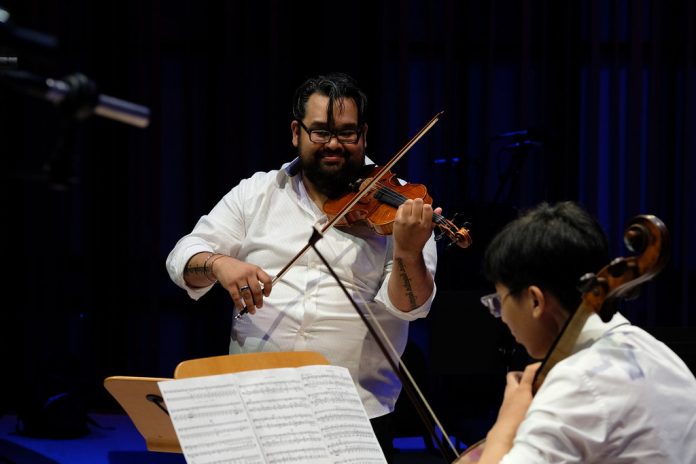Ariel Andres
Staff Writer
UC Santa Barbara (UCSB) Arts and Lectures hosted a conversation with Vijay Gupta last Thursday. A lifelong musician, Gupta boasts a long resume of impressive accomplishments. He made his solo debut at only 11 years-old for the Israel Philharmonic Orchestra and was a member of the Los Angeles Philharmonic for 12 years. Currently focusing his efforts on social justice advocacy, he is the founder and Artistic Director of Street Symphony, a non-profit organization providing musical engagement, dialogue and teaching artistry for houseless and incarcerated communities in Los Angeles (L.A.).
Gupta opened the evening by discussing his childhood. He recounted how he was constantly immersed in music from a young age, and was determined to learn as much as he could about it. However, he noted that he was never able to fully appreciate the stories and emotions that went behind the classical pieces he was learning.
Only as an older and more emotionally mature person was he able to understand the emotional depth that music has and the visceral responses it evokes. Betrayal, regret, love, hope, and other elements of the human experience are deeply embedded into the core of music. Gupta noted that such a realization about music’s power to elicit emotions became crucial to his work as an activist and citizen-artist.
He began to combine his music with activism when he came across Los Angeles’ skid row at the age of 20. “It was the physical sensation here in my gut,” he said, seeing the homeless in L.A. for the first time. “It was part guilt, part shame, He began to combine his music with activism when he came across Los Angeles’ skid row at the age of 20. “It was the physical sensation here in my gut,” he said, seeing the houseless in L.A. for the first time. “It was part guilt, part shame, part curiosity, and part recognition.”
This recognition of people who were so vulnerable sparked a flame inside of Gupta. He saw that no matter how much society wanted to cast these people aside, they still had a beautiful core of resilience within them and that they were still humans like everyone else.
That’s where the idea for Street Symphony came to life: determined to add vitality and warmth to people on skid row, Gupta began calling hospices, social workers, and physicians in the area and playing small private concerts for them. Deeply emotional, these concerts encouraged many of Gupta’s audience members to share their life stories with him and the other musicians.
“That’s why we started this,” Gupta said of the project. “The music was not the end, it was the beginning. It was the beginning of a conversation to say, ‘This is what we’ve got. What do you have? What’s your story?’”
That’s why we started this,” Gupta said of the project. “The music was not the end, it was the beginning. It was the beginning of a conversation to say, ‘This is what we’ve got. What do you have? What’s your story?’
I was moved and impressed by Gupta’s openness and focus on helping those who need it the most. As someone who experienced homelessness when I was younger, I know firsthand that even the simplest gestures can have lasting impacts on the well-being of someone living on the edge of desperation and fear.
I could tell that the rest of the audience was moved and captivated by what Gupta was saying as well. There was not a single person who looked like they were bored or distracted. They all laughed when Gupta made jokes, and they let out sighs of understanding when he made profound observations about life and people.
Gupta also touched on the science of music as an instrument for healing, shedding light on an interesting, but overlooked aspect of the discipline. He presented scientific anecdotes, such as research showing how playing a musical instrument leads to higher brain mass in children, and a study that found singing could help speech-impaired patients form coherent sentences and even help them develop new speech centers in their brains. His stories highlighted music as a form of healing — especially for those experiencing hardships, such as mental illness or homelessness.
The conversation ended with Gupta playing Paul Cohen’s Hallelujah on his violin, asking the audience to sing hallelujah in the appropriate parts to emphasize the conversational power of music. It was a powerful moment because it created a feeling of warmth, comfort, and community. It also highlighted what Gupta said about the emotional power of music. Admittedly, I teared up every time the audience sang together.
All in all, this conversation was captivating, enlightening, and emotional. Most importantly, it highlighted the impressive healing power that music can have and the importance of having the empathy to see beyond our own troubles and into those of others.











